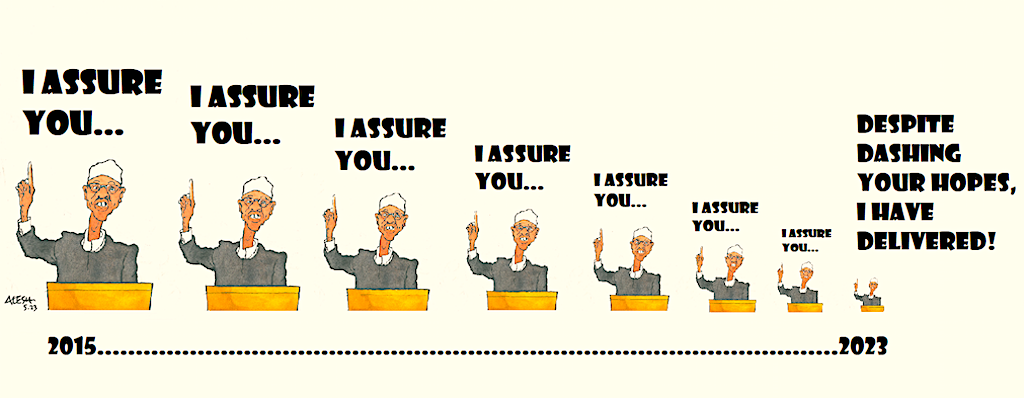PUNCH EDITORIAL
MAJOR GENERAL Muhammadu Buhari (retd.) bows out today as the fourth Executive President of Nigeria’s Fourth Republic, and the fifth in its history, and across the country and its far-flung diaspora, a loud, collective sigh of relief can be heard. It has by a wide consensus been eight locust years of privation, insecurity, division, shortages of essential food and energy and of despair. Buhari misgoverned Nigeria, deepened its political and social fault lines, enthroned sectionalism, and nepotism, oversaw two economic recessions and undermined democracy and the rule of law. Most Nigerians are happy to see him go.
Some did not survive to see this day as thousands died in the rage of the insecurity on his watch, others were displaced from their homes, many more have slipped unto poverty, and millions are unemployed. Hunger stalks millions; farmers in various parts of the country are distressed by a poor operating environment exacerbated by Fulani herders’ and bandits’ despoliation. Businesses face turbulence and millions of small ones have crashed.
Rising to power on a wave of popular discontent against 16 years of corrupt misgovernance, he met a country in trouble. He postured as a driver of change: an anti-corruption crusader, tough on crime and insecurity, a unifier in a fractured polity. Though he had projected an image of moral rectitude, in office, Buhari ended up adding only little value across the board – economic, political, and social – but ratcheted up many minuses.
A considerable proportion of the population view him as Nigeria’s worst leader since independence. But in the midst of despairing criticism, Buhari has a retort: “I have done my best.” For Nigerians, however, his best was simply not good enough.
Posterity will eventually settle the argument. For now, however, stakeholders have found him wanting. Buhari and his supporters, including regime officials, appointees and members of his party, family, and kinsmen, insist he has done well, citing policies and projects to support this. The Presidency’s ‘Factsheet’ provides a long list of such achievements and his ministers do too. Unarguably, the capital projects he undertook, though too little to reverse the country’s gaping infrastructure deficit, went further than his predecessors.’
But as he steps aside, it is necessary to take broad views of the national condition in June 2015 and in May 2023; examine Buhari’s own promised agenda, and how he delivered or failed to do so. The main themes are national cohesion and inclusion, the viability of the Nigerian state, leadership style, restructuring and elections.
Buhari’s inaugural speech on May 29, 2015, set out declarations of intent and raised hopes. Had he faithfully followed through, Nigeria should be marching from a solid pedestal unto greatness.
Buhari famously declared: “I belong to everybody, and I belong to nobody.” This resonated widely and taken together with pledges to work for the unity of the country and instil fairness and equity, it inspired hopes of inclusion.
But such hopes were promptly dispelled. Buhari thoroughly mismanaged Nigeria’s diversity. Never in the country’s history, thundered Junaid Mohammed (now deceased), a former federal lawmaker, had any national leader exhibited such brazen sectionalism, nepotism, and exclusionary tendencies in appointments to national offices. Unapologetically, he favoured his ethnic nationality, his northern base, his Islamic faith, family, associates, and narrow political interests in appointments and policies.
He followed through his declaration in a CNN interview to treat those who gave him “95 percent” vote more favourably than those who gave him “five percent.”
With him in office, the Fulani herders, gunmen and militants, joined by tens of thousands of others converged from all over West Africa, unleashing violence across the northern states. They spread their pillaging, massacres, and ethnic cleansing to other parts of the country. By late 2015, the Global Terrorism Index had ranked them as the world’s fourth deadliest terrorist group. They killed 847 persons in five states that year.


